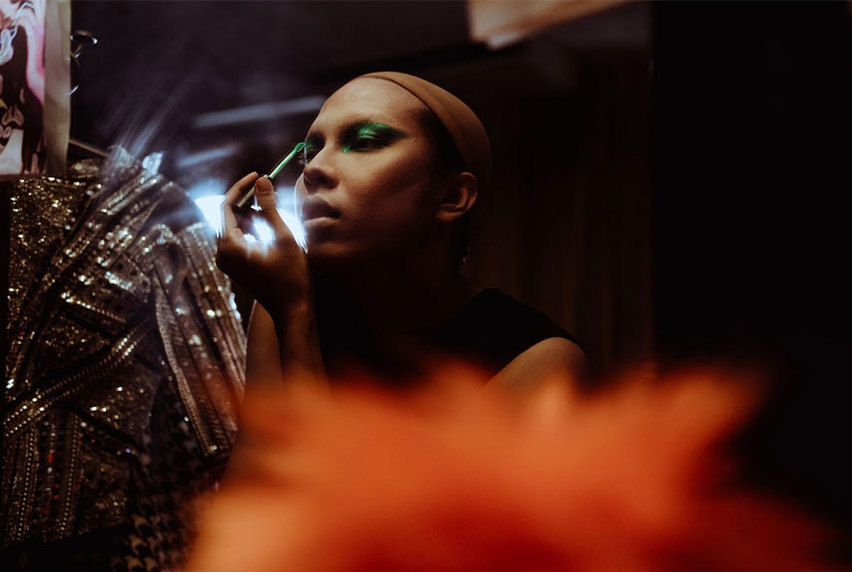This stage life: Colouring a Career in Stage Make-Up

Stage makeup plays a crucial role in bringing characters to life in the entertainment industry. A career in stage makeup can be exciting, challenging and rewarding for those with a passion for beauty, creativity and the performing arts. In this blog, we will explore what it takes to pursue a career in stage makeup in Australia.
Careers for stage makeup artists
What is stage makeup?
Stage makeup is the application of makeup and prosthetics to enhance the appearance of actors on stage and screen. It can help bring characters to life, create illusions and convey emotions. Stage makeup artists must have a keen eye for detail, creativity and the ability to work under pressure.
What are the career options for stage makeup artists?
A career in stage makeup can lead to a variety of job opportunities in the entertainment industry. Stage makeup artists can work in theatre, film, television and advertising. They may work as freelancers or be employed by production companies, studios, or makeup brands.
There are several career paths available for stage makeup artists. Some of the most common ones include:
Theatrical Makeup Artist
A theatrical makeup artist creates the look and feel of characters in stage productions. They are responsible for designing and applying makeup on the actor’s face that matches the overall vision of the production.
Screen and Media Industry Makeup Artist
A film and television makeup artist creates the look and feel of characters in movies and television shows. They work closely with the director and other members of the production team to design and apply makeup that matches the overall vision of the production.
Special Effects Makeup Artist
A special effects makeup artist creates makeup effects that are used in movies, television shows and live performances. They are responsible for creating realistic-looking injuries, wounds and other effects.
Freelance Makeup Artist
A freelance makeup artist is self-employed and works on a project-by-project basis. They can provide specialist makeup services for theatre productions, film and television, or even for special events like weddings and photo shoots.
How to choose the right stage makeup course?
There are several stage makeup courses and training programs available in Australia. These programs offer training in makeup techniques, product knowledge and safety protocols. Students can learn about the different types of makeup used in the industry, including special effects makeup and prosthetics.
What should I consider when selecting a stage makeup course?
When selecting a stage makeup course, it's important to consider factors such as the course content, the duration of the program, the qualifications of the instructors and the reputation of the institution. It's also beneficial to choose a course that offers hands-on experience and opportunities for networking with professionals in the industry, such as our Diploma of Screen and Media CUA51020 (Specialist Make-up Services) course held at our Prahran campus.
To become a successful stage makeup artist, you need to have a solid understanding of makeup techniques and the ability to apply them in a creative and artistic way. Here are some tips on how to choose the right stage makeup course:
Industry professionals
Look for courses that are taught by experienced professionals who have worked in the industry. They can provide you with valuable insights and practical knowledge that will help you succeed.
Range of techniques and styles
Choose a course that covers a range of makeup techniques and styles, including period makeup, special effects makeup and character makeup.
Hands-on training
Look for courses that provide hands-on training and opportunities to work on real productions. This will give you the chance to develop your skills in a practical setting and build a portfolio of work.
Networking
Consider courses that provide opportunities to network with industry professionals. This can help you make connections that may lead to future work opportunities.
How can I build a successful career in the stage makeup industry?
If you have a passion for makeup and are interested in pursuing a career in the entertainment industry, then stage makeup could be the perfect career for you.
As a stage makeup artist, you will be responsible for creating makeup looks that help bring characters to life on stage or screen. Here are some tips for building a successful career in the stage makeup industry:
Develop your skills
To become a successful stage makeup artist, you need to have a wide range of skills. This includes knowledge of different makeup techniques, an understanding of colour theory and the ability to work quickly and efficiently under pressure. Consider taking courses or workshops to develop these skills.
Build your portfolio
To showcase your skills and attract potential clients, it's important to have a strong portfolio. Take photos of your work and keep them organised in a digital or physical portfolio that you can easily show to potential clients.
Network
Networking is essential in the entertainment industry, and stage makeup is no exception. Attend industry events, join professional organisations and connect with other makeup artists and industry professionals on social media.
Seek out opportunities
Look for opportunities to gain experience and build your reputation. This could include volunteering at local theaters, working on independent films, or assisting established makeup artists.
Keep up with industry trends
The entertainment industry is constantly evolving, so it's important to stay up to date with the latest trends and techniques. Attend workshops and conferences, read industry publications, and follow other makeup artists on social media to stay informed.